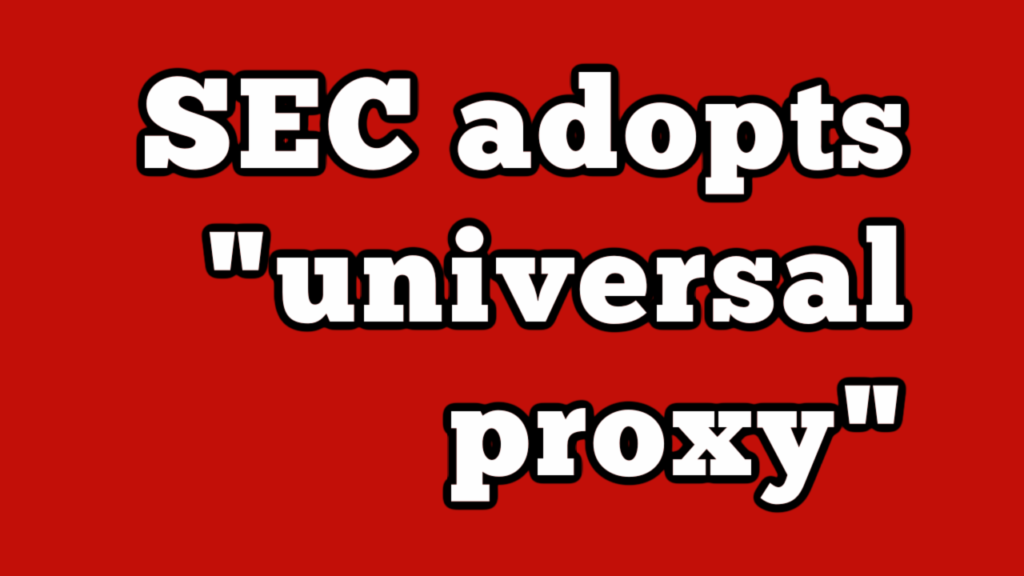SEC adopts “universal proxy”

Yesterday, the SEC adopted a rule that allows for “universal proxy” – five years from when the rule was first proposed. The new rule takes effect next August. Under the prior framework, dissidents had to use their own proxy card to solicit votes; under the new framework, both management’s and the dissident’s slate will be on the same proxy card – arguably making it easier for shareholders to check a box and vote for the dissident’s slate if they so choose to do so.
Here’s an excerpt from this Sidley memo about things to consider for public companies:
– Boards of directors may expect dissident shareholders to use the availability of the universal proxy card — and the specter of the unknown it creates — as an additional source of leverage when they make demands to, and negotiate with, boards. It is uncertain whether the new regime will give dissidents new advantages at the ballot box. Public advocates of shareholder activism have, however, championed the adoption of the new rules. Their enthusiasm may reflect a premonition that the universal proxy card will afford dissidents with additional leverage when negotiating with boards and ultimately allow them to place more dissident candidates on boards through negotiations and proxy contests.
– The Universal Proxy Rules constitute a seismic shift in the regulatory regime governing proxy contests at public companies, but the new rules contain few guardrails to protect against misuse. Unlike comparable rules previously adopted by the SEC, the new rules provide no barrier to entry in the way of fixing a minimum amount or duration for stock ownership. They provide no meaningful consequences for shareholders that initiate a proxy contest insincerely, causing a company to expend resources but without the intent follow through. To the extent a company has not been thoroughly evaluating its shareholder activism preparedness and defenses outside of the proxy seasons, the coming year is a good time to start.
– Advance notice bylaws — which impose requirements on dissident shareholders to provide information about dissident candidates in advance of the dissemination of proxy statements — have become all the more important as a last line of meaningful screening of dissident nominees. To help ensure the quality of dissident director candidates and to protect a company and its shareholders from misuse of annual elections and proxy machinery, a company’s advance notice bylaws should be thorough and designed in the interest of obtaining information a company needs to vet director candidates before they are nominated and elected to a board of directors. Advance notice bylaws have long been enforced by state courts. They were recently given additional, significant support by the Delaware Court of Chancery in Rosenbaum v. CytoDyn, a case argued and won by Sidley attorneys.
– Public companies should review the applicability of the Universal Proxy Rules to their peacetime disclosure requirements. The new rules require, among other things, that a company disclose in its annual proxy statement the deadline for shareholders to give timely notice to the company of dissident nominations for the next annual meeting and that a company include specific disclosures concerning its voting standards.
– If faced with dissident nominations in the coming year, it will be especially important for companies to apply the Universal Proxy Rules accurately to their disclosures and solicitation process. The SEC is likely to be vigilant of proxy materials in contested elections in the upcoming proxy seasons on account of the new rules. Consulting with counsel experienced in proxy contests will smooth the path to clearing SEC review and other regulatory barriers and soliciting proxies quickly and efficiently.
